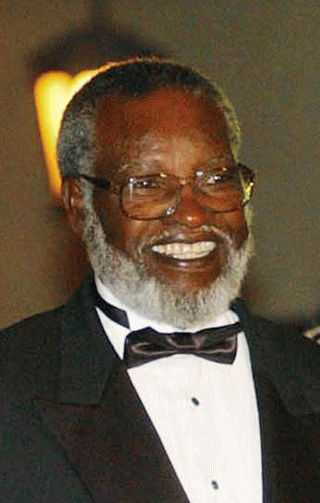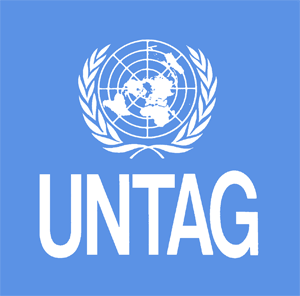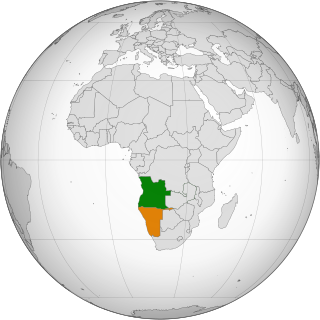Related Research Articles

After independence in 1964 the foreign relations of Zambia were mostly focused on supporting liberation movements in other countries in Southern Africa, such as the African National Congress and SWAPO. During the Cold War Zambia was a member of the Non-Aligned Movement.
The history of Namibia has passed through several distinct stages from being colonised in the late nineteenth century to Namibia's independence on 21 March 1990.

The South West Africa People's Organisation, officially known as the SWAPO Party of Namibia, is a political party and former independence movement in Namibia. Founded in 1960, it has been the governing party in Namibia since the country achieved independence in 1990. The party continues to be dominated in number and influence by the Ovambo ethnic group.

Samuel Shafiishuna Daniel Nujoma, is a Namibian revolutionary, anti-apartheid activist and politician who served three terms as the first President of Namibia, from 1990 to 2005. Nujoma was a founding member and the first president of the South West Africa People's Organization (SWAPO) in 1960. Prior to 1960, SWAPO was known as the Ovambo People's Organisation (OPO). He played an important role as leader of the national liberation movement in campaigning for Namibia's political independence from South African rule. He established the People's Liberation Army of Namibia (PLAN) in 1962 and launched a guerrilla war against the apartheid government of South Africa in August 1966 at Omungulugwombashe, beginning after the United Nations withdrew the mandate for South Africa to govern the territory. Nujoma led SWAPO during the lengthy Namibian War of Independence, which lasted from 1966 to 1989.

Bience Philomina Gawanas is a Namibian lawyer who served as Special Adviser on Africa for the United Nations from 2018 to 2020.

The South African Border War, also known as the Namibian War of Independence, and sometimes denoted in South Africa as the Angolan Bush War, was a largely asymmetric conflict that occurred in Namibia, Zambia, and Angola from 26 August 1966 to 21 March 1990. It was fought between the South African Defence Force (SADF) and the People's Liberation Army of Namibia (PLAN), an armed wing of the South West African People's Organisation (SWAPO). The South African Border War was closely intertwined with the Angolan Civil War.

Cassinga or Kassinga is a town and commune in the municipality of Jamba, province of Huíla, Angola.

The Caprivi conflict was an armed conflict between the Namibian government and the Caprivi Liberation Army, a rebel group that waged a brief insurrection in 1999 for the secession of the Caprivi Strip.

The South West Africa National Union (SWANU) is a Namibian political party founded in 1959. Most of its members came from the Herero people, while fellow independence movement SWAPO was mostly an Ovambo party. The party's president is Evilastus Kaaronda.

The United Nations Transition Assistance Group (UNTAG) was a United Nations (UN) peacekeeping force deployed from April 1989 to March 1990 in Namibia, known at the time as South West Africa, to monitor the peace process and elections there. Namibia had been occupied by South Africa since 1915, first under a League of Nations mandate and later illegally. Since 1966, South African forces had been combating an insurgency by the People's Liberation Army of Namibia (PLAN), the military wing of the Namibian-nationalist South West African People's Organization (SWAPO). The UN Security Council passed Resolution 435 in 1978, which set out a plan for elections administered by South Africa but under UN supervision and control after a ceasefire. However, only in 1988 were the two parties able to agree to a ceasefire. As UNTAG began to deploy peacekeepers, military observers, police, and political workers, hostilities were briefly renewed on the day the transition process was supposed to begin. After a new round of negotiations, a second date was set and the elections process began in earnest. Elections for the constitutional assembly took place in November 1989. They were peaceful and declared free and fair; SWAPO won a majority of the seats. The new constitution was adopted four months later and it was followed by Namibia's official independence and the successful conclusion of UNTAG.

The People's Liberation Army of Namibia (PLAN) was the military wing of the South West Africa People's Organisation (SWAPO). It fought against the South African Defence Force (SADF) and South West African Territorial Force (SWATF) during the South African Border War. Throughout its history, PLAN had both irregular insurgent and semi-conventional units, as well as an extensive recruitment network in rural South West Africa (Namibia). During the war most of its domestic activities consisted of mine warfare and acts of sabotage. PLAN initially lacked any standing units, and the bulk of operations were carried out by political exiles who spent cyclical periods residing in refugee camps in neighbouring states before launching raids inside South West Africa itself. By the end of the war, PLAN had 32,000 militants under arms, including three battalions of semi-conventional troops equipped with heavy weapons.

Angolan–Namibian relations relate to the relations between the governments of the Republic of Angola and the Republic of Namibia.

Cuba–Namibia relations are the bilateral relations between Cuba and Namibia. Both nations are members of the Group of 77, Non-Aligned Movement and the United Nations.
Reinhard "Kalla" Gertze was a Namibian university lecturer and parliamentarian as a member of the Congress of Democrats (CoD) party. He was in the National Assembly from 2005 until his death in 2008 and had previously been a lecturer at the University of Namibia.
Eric Biwa is a former Namibian politician with the Patriotic Unity Movement (PUM), a party which was a member of the United Democratic Front (UDF).
Erastus Amutenya Uutoni is a Namibian SWAPO politician who has served in the cabinet of Namibia since March 2010.
George Tuliameni Kalomoh is a Namibian politician and diplomat. He is a former ambassador of SWAPO to India, ambassador of Namibia to the United States of America, assistant secretary-general in the United Nations, and deputy minister of foreign affairs.
Pauline Frannzisca Dempers is a Namibian human rights activist and politician. In 1996, Dempers became national coordinator for Breaking the Wall of Silence (BWS), a group which advocates for the rights of those detained by SWAPO during the Namibian War of Independence. Dempers was active with the Congress of Democrats.
Peter Eneas Nanyemba,, (1935–1983) was a commander of the People's Liberation Army of Namibia (PLAN) during the South African Border War. Nanyemba worked as a diplomat, representing SWAPO in Botswana and Tanzania, before he was elected as the party Secretary of Defence in 1970. He played an important role as the chief organizer of PLAN during the beginning stages of the war of independence. Nanyemba is considered a national hero in Namibia.
References
Notes
- ↑ Namibia: An organization called Breaking the Wall of Silence; its mandate, membership and activities (1990-September 2002) Archived October 7, 2012, at the Wayback Machine published first by Immigration and Refugee Board of Canada, re-published by UNCHR, 17 September 2002
- 1 2 "Who's Who, Dempers, Pauline Franzisca - Civil society". Namibia Institute for Democracy (NID). Archived from the original on 11 June 2011. Retrieved 2 September 2011.
- ↑ Lister 2021, pp. 178–179.
- ↑ Lister 2021, p. 260.
- ↑ Lister 2021, p. 259.
- ↑ Lister 2021, p. 315.
- ↑ Weidlich, Brigitte (20 March 2008). "Tributes flow for MP Gertze". The Namibian . Archived from the original on 30 January 2022. Retrieved 30 January 2022.
Literature
- Lister, Gwen (2021). Comrade Editor. On Life, Journalism and the Birth of a Nation. Tafelberg. ISBN 978-0-624-0-9256-8.
- Groth, Siegfried (1995). Namibia. The Wall of Silence: The Dark Days of the Liberation Struggle. Peter Hammer Verlag . ISBN 978-3872947086.